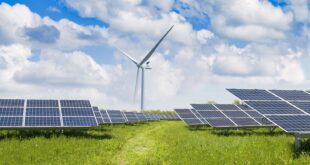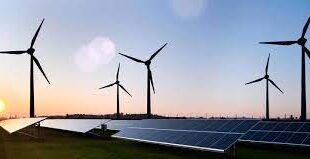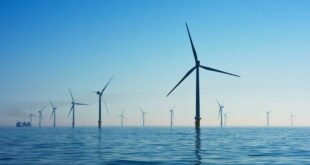Britain is on track to achieve a tipping point in 2019 as reliance on cleaner energy sources wind. solar. nuclear and hydro outstrip coal and gas-fired generation following a decade-long transformation in the power system.
In 2009. three-quarters (75.6%) of electricity generation came from fossil fuels coal and gas. and just 22.3% was zero-carbon.
But in the first six months of 2019. zero carbon sources made up 47.9% of the mix. overtaking fossil fuels which were at 46.7%. National Grid said.
The figures for 2019 so far include the mix of power that is coming through underwater cables known as interconnectors from other countries. such as France.
Coal’s share of generation has tumbled from 30.4% in 2009 to just 2.5% this year. while wind has increased dramatically from 1.3% a decade ago to 18.8% in 2019.
In May. Britain saw its first coal-free fortnight and generated record levels of solar power for two days in a row. supplying more than a quarter of the country’s daily electricity consumption. the company said.
The switch was described by National Grid chief executive John Pettigrew as a key milestone on the journey towards net zero.
The incredible progress Britain has made in the past 10 years means we can now say 2019 will be the year zero-carbon power beats fossil fuel-fired generation for the first time. he said.
National Grid said innovative approaches including linking up Britain’s electricity grid to neighbouring countries with more interconnectors would help cut carbon emissions in the future.
By 2030. Britain will have six interconnectors linking it up to other countries. and 90% of the power they import will be zero-carbon – up from 63% today.
The clean power will be coming from sources such as Norway’s largest hydrodam via a new North Sea Link. which will start operating in late 2021 and will allow British homes to use electricity generated by water in Norway.
Overall. the interconnectors will cut carbon emissions from the electricity sector by 17%. or six million tonnes. by the end of the next decade.
As the UK decarbonises and we’ve more intermittent wind. the opportunity. when we’ve got too much. to export to Europe means renewable sources will be better used and that’s beneficial to consumers in terms of cost. Mr Pettigrew said.
And in the face of calls from Labour to nationalise the company. he said: I’ve been very clear we don’t feel it’s in the interests of consumers or beneficial to the decarbonisation agenda for National Grid to be nationalised.
He said there was a need to accelerate all the things that were already being done to decarbonise the economy. from continuing to reduce pollution from electricity to more electric vehicles and cutting emissions from heating homes.
 Iran Energy News Oil, Gas, Petrochemical and Energy Field Specialized Channel
Iran Energy News Oil, Gas, Petrochemical and Energy Field Specialized Channel




